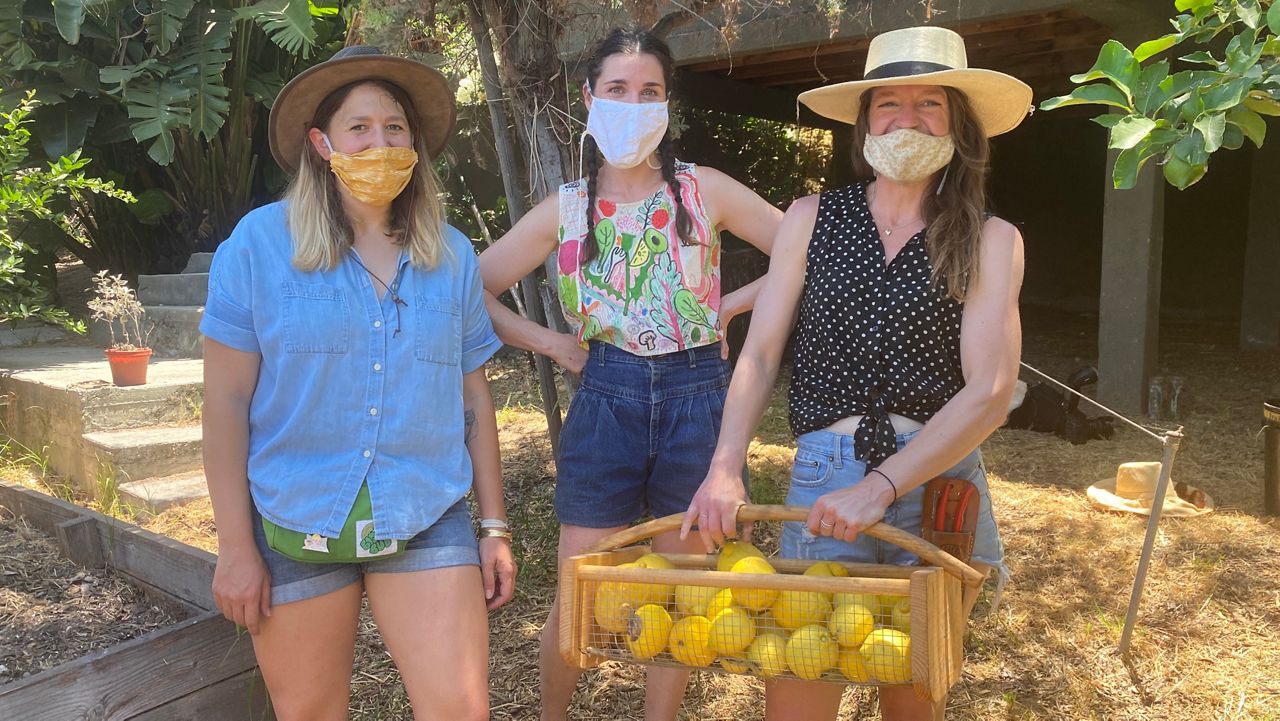LOS ANGELES – Demi Flaeton was in Glassell Park over the weekend, gathering fresh apples, lemons, and grapefruits. But she wasn’t getting them from a grocery store or farmer’s market. She was picking them out of a basket that had been left on the sidewalk during something called the L.A. Fruitshare.
“There are a lot of fruit trees, and I know how much of it goes to waste,” said Flaeton, a self-described fresh fruit fanatic who had seen the event promoted on Instagram and drove from Hollywood to participate.
Flaeton was one of more than 1,100 people across the city who came together Sunday, either to share the fruits from their backyard trees with strangers, or to take that produce home. A downloadable Google map that used pins to anonymize givers’ personal addresses guided participants to the fruit pickup spots, many of which were simple cardboard boxes or plastic buckets marked with homemade signs describing the offering and its origin.
“I haven’t bought a lemon in three years,” said Joanna Glovinsky, co-founder of the L.A. Fruitshare and founder of the Fruitstitute, a business that takes care of backyard fruit trees across L.A. County.
On Sunday, she was scavenging grapefruits from her backyard in Mt. Washington and lemons from her neighbor’s tree across the street for the event.
“There’s so much fruit in this city, and people don’t see it,” she said. ”There's people who have lemon trees in their backyard but buy lemons from the store, so we’re on a mission to change that.”
Earlier this year, Glovinsky partnered with two other groups for what they initially envisioned as an in-person fruit swap. Then the pandemic hit, prompting them to reimagine the event as a sort of socially distanced scavenger hunt to help foster community and fight food insecurity.
“We didn’t plan it to be timed this way,” said Alia Haddad, co-founder of the L.A. Fruitshare and events and partnerships manager with Food Forward, a nonprofit gleaning group that recovers produce that would otherwise go to waste and distributes it to hunger relief agencies, such as food banks.
As the pandemic worsened, Haddad said, “It became so much clearer how important this was for the community of L.A., which is home to so many orange orchards and so many citrus trees. We have such an abundance in this city, and yet we have such a need.”
Even before the pandemic, one in nine people in L.A. County was food insecure, Haddad said. The numbers have only worsened since April. According to the Brookings Institution, almost one in five mothers with a child age 12 and under now says their children are not getting enough to eat or that they do not have enough money to buy more food.
The L.A. Fruitshare is part of a larger, ongoing movement to help with COVID-induced food insecurity. Little Free Pantries, which operate like Little Free Libraries only with food, and so-called friendly fridges are popping up around the country to help those in need.
“A lot of people are reaching out to their neighbors and their communities and having conversations about barter and share and thinking about what goes to waste,” said Julia Sherman. An L.A. Fruitshare co-founder, she is also a food writer, artist and cookbook author who runs the blog, Salad for President.
Sherman has fruit trees at her home in Pasadena and a vegetable garden in her front yard that is not fenced off that “has been an amazing way to have conversations with people,” she said. “For me, fruit and food is a way of getting to know people, opening up doors” and fostering community in a car-oriented city that often makes true connections difficult.
For Sunday’s event, she had harvested peaches and lime leaves from her yard, which she set out in a colorful box decorated with hot pink and purple tissue paper.
“I don’t have that much at the moment,” she said. But come February, when the L.A. Fruitshare is planning to have its next event in a series its founders hope will become biannual, “I should be the house to camp out at overnight.”



